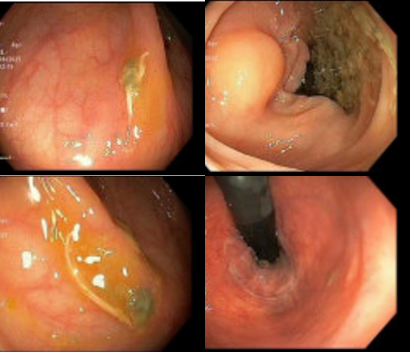Tuesday Poster Session
Category: Infections and Microbiome
P5612 - Trichuris Causing Severe Iron Deficiency Anemia in an Adult in a Non-Endemic Area
Tuesday, October 28, 2025
10:30 AM - 4:00 PM PDT
Location: Exhibit Hall

Hunardeep K. Boparai, MBBS
Maimonides Medical Center
Brooklyn, New York
Presenting Author(s)
Samar Pal S. Sandhu, MBBS, Hunardeep K. Boparai, MBBS, Tanuj Chokshi, DO, Seth Lapin, DO, Ira Mayer, MD, FACG
Maimonides Medical Center, Brooklyn, NY
Introduction: Iron deficiency anemia (IDA) is a common finding with varied etiologies, often prompting gastrointestinal (GI) evaluation. Parasitic infections like Trichuris trichiura (whipworm), though rare in developed countries, remain an important yet under-recognized cause of IDA and GI symptoms, particularly among individuals with relevant exposures in non endemic areas.
Case Description/
Methods: A 55-year-old South Asian woman with a history of diabetes, hypertension, hypothyroidism, and GERD, was evaluated for incidental severe microcytic anemia requiring transfusion. The patient was recently admitted to the hospital for an oral abscess requiring drainage and IV antibiotics. Chronic betel leaf chewing was believed to contribute to the oral abscess along with poor oral hygiene. She reported intermittent abdominal discomfort and diarrhea daily but denied overt GI bleeding or weight loss.
Lab work showed borderline low iron studies despite being on oral supplementation and mild peripheral eosinophilia. Stool studies including ova & parasites were negative. EGD revealed mild gastritis; colonoscopy identified internal hemorrhoids, a subepithelial lesion likely a lipoma, and parasitic infestation throughout the colon with majority in ascending colon. Biopsies confirmed Trichuris trichiura. She completed albendazole therapy but was unable to access ivermectin due to insurance limitations. Follow-up was arranged to assess treatment response.
Discussion: This case highlights the diagnostic challenge of chronic whipworm infection in adults outside endemic regions. Clinical suspicion was raised by subtle GI symptoms, severe iron deficiency despite being on oral supplementation, and mild eosinophilia. Standard stool studies were negative; diagnosis was only confirmed via colonoscopy and histopathology. Early recognition and targeted therapy are crucial to preventing complications such as Trichuris Dysentery Syndrome (TDS). TDS is well documented in children in endemic areas with symptoms ranging from occult or overt bloody diarrhea, rectal prolapse, nutritional deficiency leading to growth and mental retardation. TDS in adults is rare with the majority having no to minimal non specific abdominal symptoms such as abdominal pain, diarrhea, occult bleeding, and IDA is usually the reason for endoscopic evaluation which shows large parasite infestation confirming the diagnosis. A broader differential, cultural competence, and attention to healthcare access can guide appropriate workup and management.

Figure: Colonoscopy showing internal hemorrhoids, a lipoma, and parasite-Trichuris
Disclosures:
Samar Pal Sandhu indicated no relevant financial relationships.
Hunardeep Boparai indicated no relevant financial relationships.
Tanuj Chokshi indicated no relevant financial relationships.
Seth Lapin indicated no relevant financial relationships.
Ira Mayer indicated no relevant financial relationships.
Samar Pal S. Sandhu, MBBS, Hunardeep K. Boparai, MBBS, Tanuj Chokshi, DO, Seth Lapin, DO, Ira Mayer, MD, FACG. P5612 - Trichuris Causing Severe Iron Deficiency Anemia in an Adult in a Non-Endemic Area, ACG 2025 Annual Scientific Meeting Abstracts. Phoenix, AZ: American College of Gastroenterology.
Maimonides Medical Center, Brooklyn, NY
Introduction: Iron deficiency anemia (IDA) is a common finding with varied etiologies, often prompting gastrointestinal (GI) evaluation. Parasitic infections like Trichuris trichiura (whipworm), though rare in developed countries, remain an important yet under-recognized cause of IDA and GI symptoms, particularly among individuals with relevant exposures in non endemic areas.
Case Description/
Methods: A 55-year-old South Asian woman with a history of diabetes, hypertension, hypothyroidism, and GERD, was evaluated for incidental severe microcytic anemia requiring transfusion. The patient was recently admitted to the hospital for an oral abscess requiring drainage and IV antibiotics. Chronic betel leaf chewing was believed to contribute to the oral abscess along with poor oral hygiene. She reported intermittent abdominal discomfort and diarrhea daily but denied overt GI bleeding or weight loss.
Lab work showed borderline low iron studies despite being on oral supplementation and mild peripheral eosinophilia. Stool studies including ova & parasites were negative. EGD revealed mild gastritis; colonoscopy identified internal hemorrhoids, a subepithelial lesion likely a lipoma, and parasitic infestation throughout the colon with majority in ascending colon. Biopsies confirmed Trichuris trichiura. She completed albendazole therapy but was unable to access ivermectin due to insurance limitations. Follow-up was arranged to assess treatment response.
Discussion: This case highlights the diagnostic challenge of chronic whipworm infection in adults outside endemic regions. Clinical suspicion was raised by subtle GI symptoms, severe iron deficiency despite being on oral supplementation, and mild eosinophilia. Standard stool studies were negative; diagnosis was only confirmed via colonoscopy and histopathology. Early recognition and targeted therapy are crucial to preventing complications such as Trichuris Dysentery Syndrome (TDS). TDS is well documented in children in endemic areas with symptoms ranging from occult or overt bloody diarrhea, rectal prolapse, nutritional deficiency leading to growth and mental retardation. TDS in adults is rare with the majority having no to minimal non specific abdominal symptoms such as abdominal pain, diarrhea, occult bleeding, and IDA is usually the reason for endoscopic evaluation which shows large parasite infestation confirming the diagnosis. A broader differential, cultural competence, and attention to healthcare access can guide appropriate workup and management.

Figure: Colonoscopy showing internal hemorrhoids, a lipoma, and parasite-Trichuris
Disclosures:
Samar Pal Sandhu indicated no relevant financial relationships.
Hunardeep Boparai indicated no relevant financial relationships.
Tanuj Chokshi indicated no relevant financial relationships.
Seth Lapin indicated no relevant financial relationships.
Ira Mayer indicated no relevant financial relationships.
Samar Pal S. Sandhu, MBBS, Hunardeep K. Boparai, MBBS, Tanuj Chokshi, DO, Seth Lapin, DO, Ira Mayer, MD, FACG. P5612 - Trichuris Causing Severe Iron Deficiency Anemia in an Adult in a Non-Endemic Area, ACG 2025 Annual Scientific Meeting Abstracts. Phoenix, AZ: American College of Gastroenterology.
